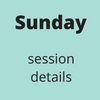Naomi van der Velden

Our Next Big Step - a permaculture collaboration
Naomi will lead an update on Our Next Big Step project, launched at the International Permaculture Convergence, 2015: Do you want to live in a world with permaculture ethics at the heart? Join the biggest ever permaculture design!
With over 3 million permaculture practitioners in over 70% of all countries, how much more could we each benefit and achieve through working together more effectively? Building on work done globally over the last few years, this workshop explores the unique role of permaculture in designing solutions to the world’s needs and guides participants to consider how we can make our best contributions.
Open to everyone with an interest in developing collaborations, building networks, and creating a permaculture world - new ideas and creativity are welcomed just as much as experience!
international.permaculture.org.uk
Liz Ashforth
Introduction to Aquaponics
Why I got into aquaponics. What is soil-less growing. Different types of aquaponics. What you can grow. Demonstration of how to build an aquaponics system.
We will have a design challenge if there’s time.
Chris Bem
Perma-Health: A theme whose time has come
Health - what does this term/state/vision mean?
The state of health of the contemporary world - an analysis
What can/what does Permaculture offer to contemporary theories and practices of health - exploring a new vision, conceptual frameworks and projects for health guided by:
-
the principles of earth care, people care, fair share
-
an understanding of living systems
-
participatory science
-
development of the HEALS course (Human and Earth Advanced Life Support course).
Graham Burnett and James Taylor
Design 4 ACTION - reframing your design challenges
Using the GoSADIM (Goal setting, Survey, Analyse, Decision making, Implementation and Maintain) design process model, experienced permaculture teachers Graham Burnett and James Taylor introduce a series of exercise and thinking tools aimed at helping us to reframe challenges and problems as opportunities to 'Design for ACTION - Active Community Transformation In Our Neighbourhoods'.
www.spiralseed.co.uk
Sophie Antonelli - Federation of City Farms and Gardens
The Growing Together Initiative - Income inspiration for community growers
A surgery for those growing or farming in a community setting to explore ways of becoming more financially sustainable. With Growing Together, a UK wide initiative that is helping groups increase their income generation and decrease reliance on grant funding.
Growing Together Advisor Sophie Antonelli invites participants to share their experiences and ideas for income generation. This session will help tackle some of the commonly experienced issues such as: governance, legal structures, business planning, legislation, financial forecasting and marketing, as well as sharing success stories from groups across the country. Less commonly experienced issues are also welcome!
www.farmgarden.org.uk/growing-together-initiative
Laura Stratford
Reciprocal Savings Pools: Financial Permaculture in action
Savings pools enable small groups to make purchases that they could individually not afford, build local resilience, and reciprocally help one another. They offer a means of staying to move away from our economic system that syphons wealth from the poorest to the richest; savings pools are a deeply fair, inter-dependent and equitable economic model.
Inspired by the zero-interest lending of the Swedish JAK bank, some permaculturists in New Zealand designed this ingenious system of resource pooling and mutual purchasing for small groups.
With support from the New Zealand permies, I am in the process of setting up the first UK savings pool, and offer to share my experience. I'll present it as an interactive workshop: we will collectively create a fictional pool, and I'll encourage questions and discussion. It's a bit complex, but well worth getting your head around!
Liz Kerry
Game Creation for communicating permaculture ideas
Using a group. I would like to investigate the creation of games to communicate permaculture ideas and brain storming. I intend individuals in the group to bounce ideas off each other and following the session to have one or more ideas for games they could create or use - either for education of for communication with clients. A simple one would be to create Snap for pest identification for work in schools.
Janta and Merav Wheelhouse
Karuna Insight Design
Examples and demonstration beyond food growing and forest garden design - including natural building and project development design.
Klaudia Van Gool
Observation through deep nature connection
We will go outside into the woodlands of Nell Bank and through various activities open our senses and deepen our connection with nature. The intention is that participants will sharpen their senses and will be better able to make objective observations for their designs.
Deano Martin
Skinny Gardening: How scientific research in soil science informs practise.
The workshop will look at scientific research, including the latest papers on humus, and how that can influence the way that people grow food and build soil fertility.
Nadia Lawton
Working with tribal women
permaculturenews.org/author/nadialawton
Andy Goldring
Permaculture Association 2.0
The Permaculture Association started in the early 80's. No mobile phones, no internet. Flyers and newsletters were printed on mechanical presses and the membership details were held on a paper index card system. How things have changed! At the moment the office and board are shifting to an online working system - 7 of our 13 part time workers now work remotely across Britain.
With an online working system for the office, the next step is to look at the opportunities available to make it much easier for members and supporters to collaborate across the network as a whole. This is not just technological. Dynamic Governance approaches like Sociocracy are being adopted in Permaculture Scotland and Paramaethu Cymru. Online tools allow participatory planning and decision making. How can we combine these different elements into a design that enables greater collaboration that can enable a bigger contribution to the wider world? Come to the session and help imagine Permaculture Association 2.0.
Juliet Wiseman
Good Food for Planet & People
From working with people who grow food and value locally grown and sustainable food I have learned what aspects of food are really valued by people who really care. Those true values of food are the ones that will help people choose good food and understand that it may be worth paying for. We need to help people to recognise real value in food and to understand how the industrial food system removes value from food and replaces value with extra costs.
Jordan Bailes
Why grow cucumbers when you can grow trees? Time rationalization for permaculturalists
As a Permaculturist, you can make an impact that will last for generations. And that is easy to forget sometimes: we need to train ourselves to be change makers. What we are doing now, can produce benefits, 10, 20, 50, 100 years into the future and beyond. OR we can waste our time. Which it is, is up to us. Whether you're new to Permaculture and want to find the best use for your time from the getgo, part way into a project & want to know how to keep motivated or feel like you're at the end of your tether, this workshop is for you. We will look at how small actions, if thought out, can have big consequences and how to take advantage of this and motivate ourselves to keep on going.
Hannah Thorogood - Diploma Tutor
The Inkpot, a Learning And Network Demonstration Centre in Lincolnshire
Come along to find out the latest from this 18 acre permaculture farm in Lincolnshire, home to Hannah Thorogood. How did we get to have nationally award winning produce & a strawbale building built on the whole by volunteers? How do we use permaculture, with food production, courses, events, volunteers and multipls generations of farmers...
the-inkpot.com
Matt Ralston, Adrian Lovett and Mark Shipperlee (Green Man Enterprises)
Practical Biochar
Practical demonstration: Using the tweaked open source clean-burn kiln(s) that Matt has built to convert wood by-products into char. "Burn the smoke and save the char!" Then quenching and inoculating it ready for horticultural use.
Catherine Weetman
Permaculture and the Circular Economy
Contrasting our current 'linear' economy to the circular economy model. What is the circular economy? Product 'teardown' - what are the issues and how would you redesign it? Circular examples from a range of industry sectors - What kind of businesses are implementing circular economy initiatives? How does it fit with Permaculture approaches?
How can businesses start their journey to a circular model?
Geoff Lawton
Permaculture Earthworks design and implementation
www.geofflawtononline.com
Scarlett Penn
WWOOF - Sharing knowledge and dispelling myths!
Find out what WWOOF is about and what is a fair exchange - gain confidence to have a go (there are lots of people who need help / armchair WWOOFers out there!)
This session aims:
-
to harvest the combined WWOOFing knowledge and perceptions of the assembled group
-
to address any questions which arise and dispel any myths
-
to raise awareness of common questions, issues and challenges hosts and WWOOFers face, and how to avoid them
-
to define the WWOOF exchange
-
to highlight the importance of good communication in organising a successful WWOOF exchange
Katie Shepherd
Creative Dying - permaculture-inspired end of life care
www.ktshepherdpermaculture.com
Niels Corfield
Designing and Managing Regenerative Farms & Smallholdings (2 Sessions)
Sessions 1: Participatory design workshop. Designing for Real style. Group will make placements of scale elements onto a paper or cloth basemap. Elements include: Windbreaks, Agroforestry, Keyline, Orchards, Forest gardens, Cropped areas, Tree based systems. (This session will take place on Saturday AM)
Sessions 2: Follow-on from design workshop. Understanding of different management options and their relative merits and considerations. Techniques include Holistic Management, Grazing systems, Animal forage and free range systems, Cover crops, Leys and pastures, No till and min till cropping, Crop rotation, Mushroom cultivation, Biochar, Keyline ploughing and subsoiling. (This session will take place on Saturday PM)


